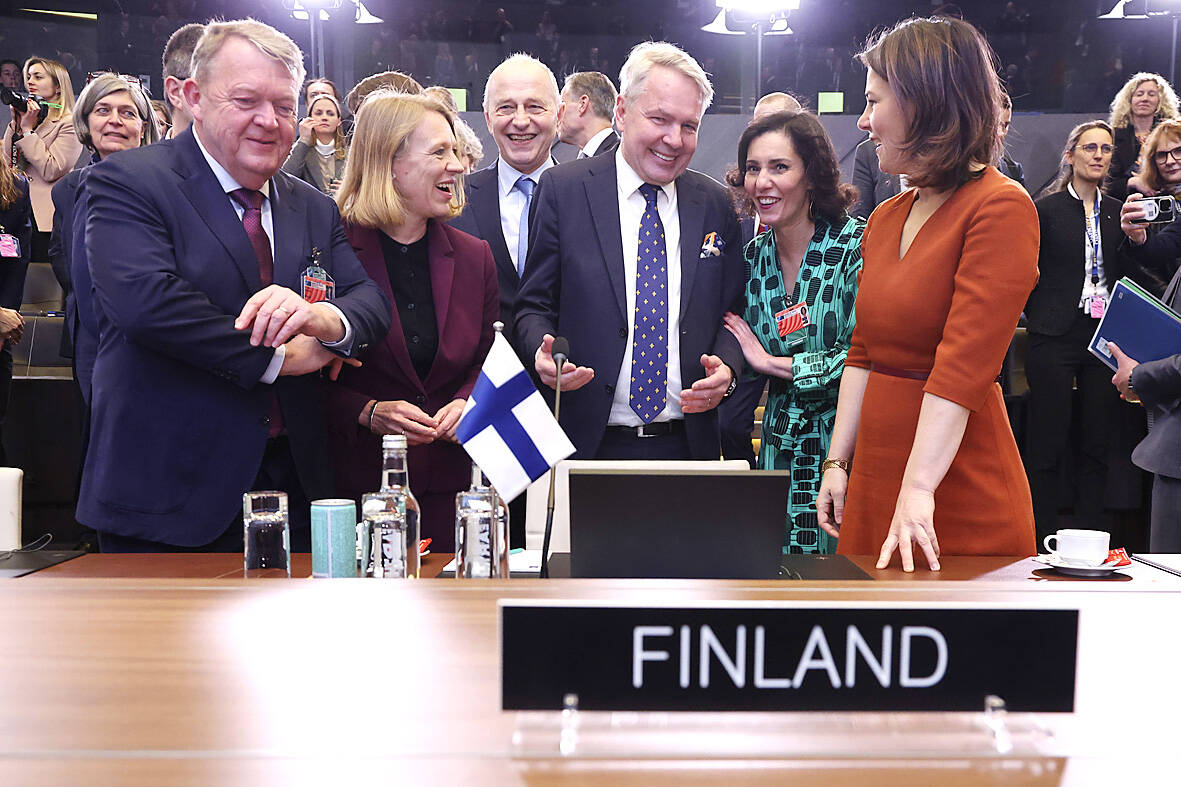Finland became the 31st member of North Atlantic Treaty Organization (NATO), completing a tumultuous process of accession sparked by Russia’s invasion of Ukraine that upended the European security landscape.
Foreign Minister Pekka Haavisto handed Finland’s accession document to US Secretary of State Antony Blinken in Brussels on Tuesday last week, marking its formal entry into the alliance’s fold. NATO foreign ministers celebrated the accession with a flag-raising ceremony later in the day.
The accession of just one of the two Nordic countries — Sweden’s application is pending — will make the alliance’s northern enlargement incomplete as NATO seeks to boost its presence in the Arctic, with the High North area’s significance increasing, as well as to gain more clout in the Baltic Sea.

Photo: AP 照片:美聯社
Finland’s addition will bring NATO more than 1,300km of border with Russia, doubling its eastern flank, and a nation that’s already prepared to defend itself in case of an all-out war. For the Finnish military, membership is a culmination of years of ever-closer cooperation, with gear used by the defense forces already compatible with that of the alliance.
The push to join NATO was triggered by Russia’s attack on a neighboring country, Ukraine, leading to a U-turn in public opinion on membership as Finns concluded that could also happen to them.
As a full member, Finland can benefit from Article 5 mutual defense commitments — meaning allies are bound to come to its aid if it’s under attack — and the Nordic country will have to be ready to defend other allies, too.
The Finnish entry is set to enable the bloc to further secure the area around the Baltic Sea in defense of its members Estonia, Latvia and Lithuania, which are often seen as potential targets of Russian aggression. It also brings another Arctic nation into the fold of the alliance, one whose military is trained for cold weather — an important asset at a time when the High North is gaining in strategic importance in light of the increased presence of Russia and China.
Having won independence in 1917 after more than 100 years as a Grand Duchy of the Russian Empire, Finns fought two wars with the Soviet Union, ceding parts of their territory in 1944. Finland then tiptoed through an era of neutrality during the Cold War — by necessity, not by choice — cowering to Moscow while retaining independence in a policy that came to be known as Finlandization.
After the collapse of the Soviet Union, the Nordic country immediately sought entry into the European fold in Sweden’s wake, with the two joining the European Union in 1995. Until last year, Finnish policy makers almost never identified Russia — at least publicly — as the primary military threat.
Geared for survival, the country of 5.5 million people has always remained on alert. It’s able to deploy 280,000 troops in wartime from a trained reserve just short of a million, thanks to a conscription-based system where most men and some women undergo military training lasting from six months to a year.
(Bloomberg)
芬蘭成為北大西洋公約組織第31個成員國,為芬蘭入盟過程的紛紛擾擾畫下句點。俄國入侵烏克蘭讓歐洲安全格局大亂陣腳,芬蘭加入北約之舉亦由此引發。
芬蘭外交部長佩卡‧哈維斯托上週二在布魯塞爾將芬蘭的入盟文件交給美國國務卿安東尼‧布林肯,代表芬蘭正式加入北約。北約外長們在當天稍晚舉行升旗儀式慶祝芬蘭的加入。
芬蘭與瑞典這兩個北歐國家皆申請加入北約,但瑞典仍未獲准加入,這將使北約的向北擴張變得不完整,因為北極圈地區的重要性增加,北約想在北極更具存在感,並在波羅的海更有影響力。
芬蘭的加入將使北約與俄國的邊界逾1,300公里,將其東翼擴大一倍,且若全面開戰,芬蘭已做好自衛的準備。對芬蘭軍方來說,加入北約是多年來密切合作的結果,國防軍使用的裝備已經與北約的裝備相容。
推動加入北約是因俄國攻擊鄰國烏克蘭,而使公眾輿論對於加入北約發生了大轉彎,因為芬蘭人認為這也可能會發生在他們身上。
作為北約正式成員,芬蘭可受益於北約第5條款所承諾的共同防禦——這表示若芬蘭受到攻擊,盟邦必會提供援助——而芬蘭這北歐國家也必須準備好保衛其他盟友。
芬蘭的加入將使北約集團能進一步保護波羅的海周圍地區的安全,以保衛北約成員國愛沙尼亞、拉脫維亞與立陶宛,這些國家常被視為俄國侵略的潛在目標。芬蘭的加入也表示又一北極國家入北約,芬蘭的軍隊受過寒冷天氣的訓練——在俄國與中國影響力增加,北極圈地區的戰略重要性越來越高的情況下,這是一項重要資產。
作為隸屬於俄羅斯帝國的芬蘭大公國一百多年後,芬蘭人於1917年贏得獨立,並與蘇聯打了兩場戰爭,在1944年割讓了部分領土。芬蘭之後在冷戰期間小心翼翼地保持中立——這是迫不得已,而非出於選擇——順從莫斯科而得以保持獨立,這也就是後來被稱為「芬蘭化」的政策。
蘇聯解體後,芬蘭立即跟隨瑞典尋求加入歐洲集團,兩國於1995年加入歐盟。在去年之前,芬蘭的決策者幾乎從未將俄國認定——起碼未公開認定——為主要軍事威脅。
為了生存,這個人口數550萬人的國家始終保持警覺。芬蘭實施徵兵制,大多數男性及部分女性接受為期六個月至一年的軍事訓練,因此戰時能夠在訓練有素、為數近一百萬的預備役中部署28萬名士兵。
(台北時報林俐凱編譯)

In an effort to fight phone scams, British mobile phone company O2 has introduced Daisy, an AI designed to engage phone con artists in time-wasting conversations. Daisy is portrayed as a kindly British granny, exploiting scammers’ tendency to target the elderly. Her voice, based on a real grandmother’s for authenticity, adds to her credibility in the role. “O2” has distributed several dedicated phone numbers online to direct scammers to Daisy instead of actual customers. When Daisy receives a call, she translates the scammers’ spoken words into text and then responds to them accordingly through a text-to-speech system. Remarkably, Daisy

Bilingual Story is a fictionalized account. 雙語故事部分內容純屬虛構。 Emma had reviewed 41 resumes that morning. While the ATS screened out 288 unqualified, she screened for AI slop. She could spot it a mile away. She muttered AI buzzwords like curses under her breath. “Team player.” “Results-driven.” “Stakeholder alignment.” “Leveraging core competencies.” Each resume reeked of AI modeling: a cemetery of cliches, tombstones of personality. AI wasn’t just changing hiring. It was draining the humanity from it. Then she found it: a plain PDF cover letter. No template. No design flourishes. The first line read: “I once tried to automate my

Every May 1, Hawaii comes alive with Lei Day, a festival celebrating the rich culture and spirit of the islands. Initiated in 1927 by the poet Don Blanding, Lei Day began as a tribute to the Hawaiian custom of making and wearing leis. The idea was quickly adopted and officially recognized as a holiday in 1929, and leis have since become a symbol of local pride and cultural preservation. In Hawaiian culture, leis are more than decorative garlands made from flowers, shells or feathers. For Hawaiians, giving a lei is as natural as saying “aloha.” It shows love and

1. 他走出門,左右看一下,就過了馬路。 ˇ He walked outside, looked left and right, and crossed the road. χ He walked outside and looked left and right, crossed the road. 註︰並列連接詞 and 在這句中連接三個述語。一般的結構是 x, y, and z。x and y and z 是加強語氣的結構,x and y, z 則不可以。 2. 他們知道自己的弱點以及如何趕上其他競爭者。 ˇ They saw where their weak points lay and how they could catch up with the other competitors. χ They saw where their weak points lay and how to catch up with the other competitors. 註:and 一般連接同等成分,結構相等的單詞、片語或子句。誤句中 and 的前面是子句,後面是不定詞片語,不能用 and 連接,必須把不定詞片語改為子句,and 前後的結構才相等。 3. 她坐上計程車,直接到機場。 ˇ She took a cab, which took her straight to the airport. ˇ She took a cab and it took her straight